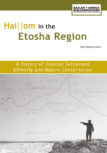Hai||om in the Etosha Region. A History of Colonial Settlement, Ethnicity and Nature Conservation
- Language: English
- 412 pages
- Illustrations, maps, tables, index
- ISSN: 2296-6986
- ISBN:
- Print: 978-3-905758-00-9
- PDF: 978-3-905758-63-4
Hai||om in the Etosha Region. A History of Colonial Settlement, Ethnicity and Nature Conservation
The Etosha Region in Namibia, comprising the famous Etosha National Park and its adjacent communal and commercial farm lands, has been a contested region since the advent of colonial settlement. The centenary of the Etosha Park in 2007 provides an opportune moment for critical reflection on its history, a much-needed appraisal achieved by this book through its multiple perspectives. At the centre of this book are the Hai||om San and their long history of dispossession and discrimination. Ute Dieckmann analyses with care the historical transformations. These were linked not only to the creation of one of the largest nature conservation areas in Africa but also to the establishment of a settler state and society. The manifold ways in which the Hai//om strive today to improve their living conditions are central to her insightful study.
Ute Dieckmann has been working with the multidisciplinary research centre ACACIA at the Institute for Social Anthropology at the University of Cologne since 1998. She is currently conducting research on the history of settlement in the Outjo-District in Namibia, paying special attention to the changing vulnerability patterns and risk-management of commercial farmers.
Genocide amnesia? An Introduction
Preface
1 The Subject and the Conceptual Framework
2 Precolonial Times, 1850–1884
3 German Colonial Period, 1884–1915
4 South African Period, 1915–1946
5 South African Period, 1946–1990
6 Independence, 1990–2004
7 Shifting Identities
8 Conclusions
Appendix
„Ute Dieckmann meticulously documents how foragers were dispossessed of their land which was then converted into settler farms or a Game Reserve to which they could return as an impoverished rural lumpen-proletariat. … To a large degree they are victims not of exploitation, but of super-exploitation in that the means for their social reproduction is being whittled away. Dieckmann documents this process painstakingly.“
Robert Gordon, University of Vermont

